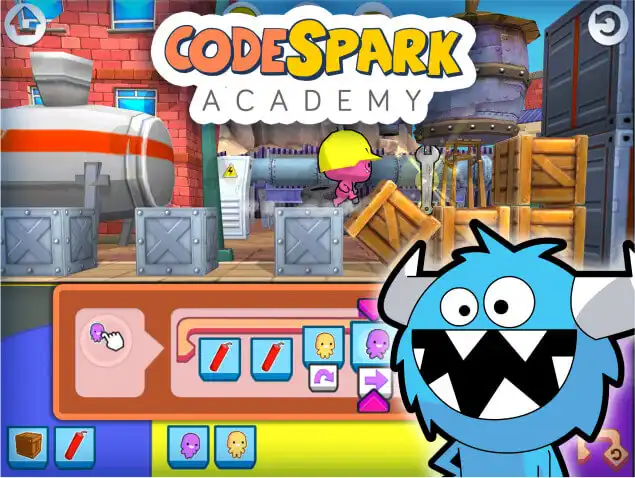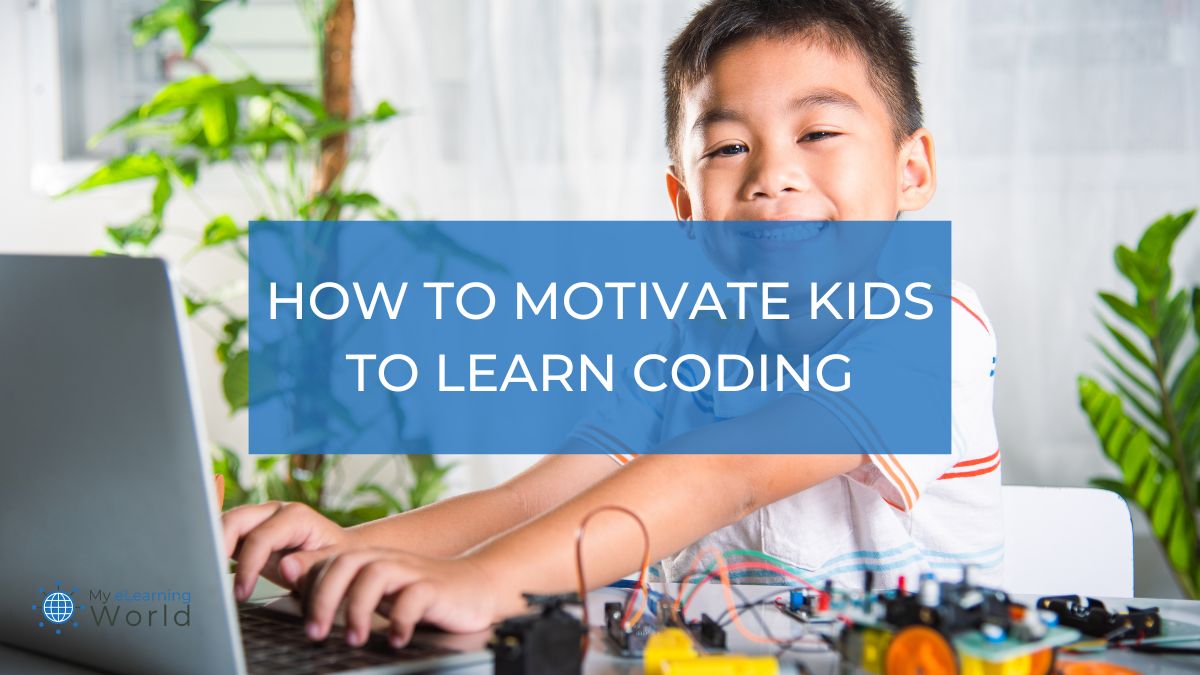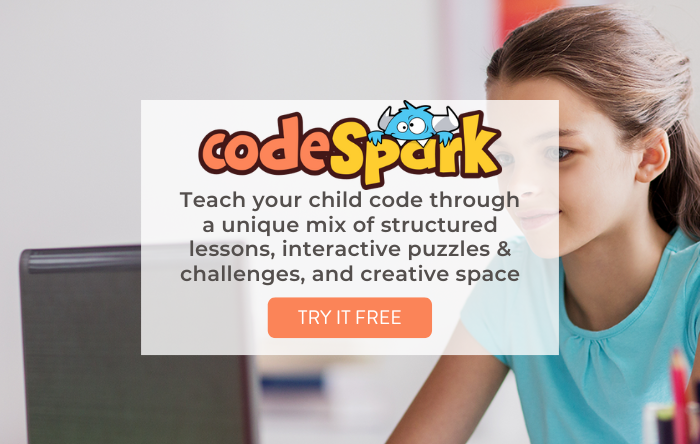Technology is in every part of our lives, from work to school to health to entertainment… and for every application you use, there’s a coding team behind it, keeping the program running smoothly.
It’s no wonder that coding skills are among the most sought-after for lucrative careers. Coding abilities can also help an application to a competitive internship or university stand out.
That’s why encouraging kids to learn to code is so important.
Plus, coding provides kids with important skills, and can help boost their creativity and self-esteem.
In this article, I’ll talk about some of the benefits of letting your child learn to code and share some tips on how to get them started.
What Can Coding Offer My Child?
1. Coding Teaches Good Thinking
In order to write code, programmers need to know how to think logically.
Even simple game sequences and loops require programmers to break the problem down step-by-step in order to tell the computer what it needs to do.
This kind of logical reasoning is an extremely valuable skill for kids to learn at a young age.
Logical reasoning helps kids learn to tackle complex problems in an organized way.
Taking the time to debug their programs when errors pop up (an inevitable part of coding!) also requires kids to think critically.
They will learn to test and figure out fixes to problems that arise in their codes, building their capacity for finding innovative solutions to setbacks in their lives.
Working through coding sequences will not only build your child’s critical thinking and logical reasoning skills…it will also help them develop a strong sense of patience and perseverance along the way.
2. Coding Teaches Confidence
Solving problems and building more sophisticated code will also boost your child’s confidence.
The more they practice coding, the better they’ll get. This natural progression will illustrate to them just how much progress they’ve made.
Your child may start out by learning one of the most simple coding languages, like Scratch. At first, they may be doing very basic activities.
If they stick with it, however, your child can make exciting gains – from learning more comprehensive coding languages to creating their very own games!
Any activity that helps your child believe in themself is valuable, especially if it’s also helping them become more rational thinkers.
After all, being a confident and effective problem-solver is a trait that extends far beyond the screen.
Good problem solving skills and self-confidence can improve the way your child tackles challenges in all areas of their lives.
3. Coding Teaches Focus
In order to code, kids need to be able to focus on what they’re doing.
Even if it might feel like play, creating a game through coding will require your child to really concentrate on each step of the process.
This is valuable for the many parents today who feel frustrated with the rapid-fire nature of screen-based entertainment for kids.
Everything seems brighter, louder, and faster than it was in the past, and some parents worry that this may be damaging their child’s attention span.
Coding offers a nice chance to break away from that pace and practice an activity that requires your child to focus and be mindful… even if it’s still on a screen.
4. Coding Builds Community
Coding opens the door to a vibrant community for kids of all ages.
Whether your child is advanced or a beginner, there’s a whole network of others at the same level who they can connect with over this shared interest.
From in-person clubs to online forums, the coding world is full of enthusiastic young people who love to share in one another’s discoveries, setbacks, and ideas.
By teaching your child to code, you’re giving them a valuable skill that may help them bond with new friends in the future (not to mention look good on a resume).
5. Coding Is Fun
Let’s not forget the obvious: coding is fun!
If your child enjoys puzzles and games, it’s likely that they’ll find coding an intriguing new challenge.
Mastering a coding language and creating a unique game can be a highly satisfying experience for young ones, especially kids who are already interested in gaming.
Coding allows kids to think creatively and share their ideas in a new way.
For a lot of kids, coding feels like a fun and exciting hobby – even if they are reluctant about other scholastic activities, like reading and math.
It may not be for every child, but coding can be a really enjoyable way for kids to express themselves, build their thinking skills, learn to focus, and connect with their peers.
If you think coding might be a good option for your kiddo, read on to learn how to get started.
How to Get Your Kid to Code
1. Explore With an App
 codeSpark Academy
codeSpark Academy
codeSpark is a fun, engaging coding app that teaches kids basic problem solving, critical thinking skills, creativity, and a host of other valuable skills. Kids will enjoy playing on the app, not even realizing how much they're learning along the way as they get prepared for the world of tomorrow.
One of the easiest and most effective ways to get your child coding is by using an online app.
Coding apps like codeSpark Academy are ideal for young ones, as they’re designed to hold their interest and feel like play.
codeSpark, based on research from MIT and Princeton, teaches your child the fundamentals of coding with a word-free, ad-free interface that they’ll love exploring independently.
Aided by entertaining characters in an interactive world, kids solve problems and discover new skills as they work through their codeSpark lessons.
The app tailors each lesson to your child’s age and skill level, so they’re less likely to lose interest or feel frustrated.
As they gradually build their coding prowess, codeSpark will increase the complexity of their lessons and help them unlock new skills.
Plus, your child can access codeSpark from any device, so it’s easy to build into your daily routine, even if you’re constantly on the go.
You can check out codeSpark’s 7-day free trial to see all it can offer your child.
Thankfully, if your child enjoys the program, codeSpark pricing for an annual membership comes out to around $7/month, so they can keep building their coding abilities without breaking the bank.
Take codeSpark for a spin and see how you can transform mindless screen time into a valuable coding experience.
2. Consider a Camp
If your child enjoys their time on a coding app, you may want to consider adding an in-person coding camp or club, too.
These offerings are becoming much more popular, so do a little digging in your community to see what options are out there.
Check at your local school, library, or community center, or search online to see what coding-related activities are available that suit your budget and time frame.
Day camps focused around coding are becoming more common, even for early elementary schoolers.
Slightly older kids can even enroll in “boot camps” that focus on helping your child reach new coding goals, whether it’s mastering a new language or creating a new game.
Plus, coding camps and classes give your child the chance to meet other kids who share their interests.
This can be a great way to make new friends while also getting hooked on code.
3. Check Out a Book
More and more books about coding are being written for kids, so don’t forget to visit your local library.
Even early readers can enjoy some of the simple coding activities and story books available today.
If your library doesn’t have the books you’re looking for, most can be purchased for an affordable price online.
Letting your child read coding books and complete on-paper coding activities can be a fun way to supplement their skills, and help them boost their reading ability at the same time!
Plus, a book is an easy way to introduce your child to coding concepts and see if it’s an area they want to learn more about.
Final Thoughts
Coding isn’t going anywhere.
As this complex set of skills becomes more and more important, it’s a great idea to see if coding is something your child would like to pursue.
Not only can it come in handy in later life, coding builds important skills for young children by fostering critical thinking, confidence, focus, and community.
You can easily spark your child’s interest by incorporating a fun coding app like codeSpark, investing in a coding class or camp, or giving them a coding-related story or activity book.
They just may thank you later on!
Do you have a kid who loves to code? Have ideas about how to foster a love of coding that we didn’t mention here? Please feel free to share your questions and comments below!


